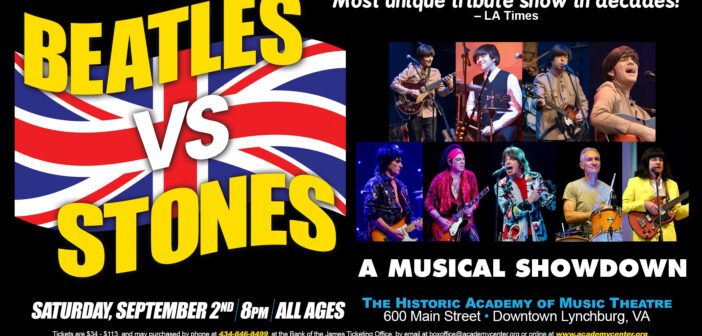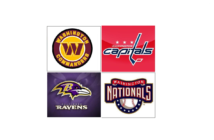By Nikita Bondale, Staff Writer
Photos: Courtesy of La Jolla Agency
Today we are talking to Axel Clarke, who plays Ringo Starr in a Beatles tribute band. The band has a show coming up in Lynchburg, Virginia on September 2nd called “Beatles vs Stones’” dedicated to the Beatles and the Rolling Stones. Axel is here to talk to us about it.
Bondale: So Axel, thanks for talking to the DC Spotlight Newspaper today! Let’s just hop into it.
Bondale: Now, before we talk a little bit about the role that you play on stage, could you tell us a little bit about yourself?
Clarke: I’ve been playing drums in the Los Angeles area for twenty plus years now and just been working around here, actually 30 plus years playing guitar. We’ve been doing the Beatles for about 12-13 years now, being in the band, so it’s kind of become a full time job.
Bondale: That’s awesome! You said that you played mostly in LA before moving out here. Are you originally from LA?
Clarke: I’m still in LA. We’re mostly a touring band. Beatles guys are all from the Los Angeles area, and the Stones band are from all over. We all just kind of meet up in certain cities and tour for a couple weeks at a time then go home.
Bondale: Nice! A little bit more about just your background. Growing up obviously you could have gone a lot of different routes. Most kids probably want to be a fireman or a cop, but you happened to end up being a musician. So, what was the inspiration behind going that route for you?
Clarke: I guess I have to pin the blame on my dad somewhat. He played guitar and sang. He wasn’t a professional, but it was always part of my life. He always had cover bands he played with that were fun, and he could never find a drummer. So I just remember being young, being interested in drums and going, maybe I could get a gig out of this. So he kind of pushed me in that direction. [I] never wanted to be a fireman. I either wanted to be a drummer or the starting quarterback for the 49ers. So at least I got one of the two.
Bondale: Really the only two options. So, you said that a lot of your inspiration came from your dad growing up. What does your family now think about you playing a rockstar in your free time?
Clarke: I think they’re proud. They were always very supportive of it. My parents were immigrants from Scotland; I was born there too. They came very much with the intention of whatever you do, we don’t care. Just make sure that it’s what you want to do. So they saw me going down music, but they could also see I was serious about it, so they encouraged me. I’m sure they had nights of worry, but it turned out alright.
Bondale: Yeah, that’s awesome that you decided to go that route. Speaking a bit more about that, I think the question everyone is thinking is, why the Beatles, especially now that other bands might be more relevant. What inspired you to dedicate yourself to the Beatles?
Clarke: Great question. Initially, it was like most of the things in my career has been. I saw a post looking for musicians and thought okay that sounds like a fun way to make some money. But once again going back to my background—I grew up on the Beatles. It was always playing in the house so the songs were just osmosis. And yeah, you could put the more “relevant” term on some bands and artists today, but the Beatles have never gone away. They’ve always been there. Any artist that tells you they weren’t influenced by the Beatles, they either don’t know where their influence is from or they’re lying. So, they’re still absolutely relevant, and we still see in the audiences from people in the 90s to people who are nine out there enjoying music. So they’re still relevant artistically, entertainment wise, and every musician loves the Beatles. Once again, if they say they don’t, they’re lying. The Beatles are ice cream, they’re always great.
Bondale: Very true and going off of your point a little bit, seeing so many people from young to older audiences who do know about the Beatles and their influence. It has to be challenging playing a figure that is so well-known. Is that the case with you playing Ringo?
Clarke: Yeah, it’s the case for all of us. Yeah you’re playing, it’s like getting cast in a movie to play a famous person that everyone knows, like Austin Butler in Elvis just last year. It’s kind of no matter what you do, someone’s going to think you’re doing it wrong. It’s always a challenge. It’s part of the job. You constantly have to please yourself and look [inward], making sure that our personalities or our playing styles aren’t starting to creep back in, so you can keep it honest and legitimate. It’s challenging with the Beatles because everyone knows those records as opposed to the Stones band. The Stones have decades of touring versions of songs that you can draw from, and people aren’t going to blink. Whereas, if we don’t play Sgt. Pepper’s exactly as it is on the record, a lot of people are going to have a raised eyebrow. So yeah, it is a responsibility.
Bondale: You beat me to the punch a little bit. I also grew up listening to a lot of the Beatles. My dad used to sing “Blackbird” to me as a kid. And I know that especially with Ringo’s original style, there were almost a lot of “imperfections” between how he played it and how it was originally written. So, do you try to replicate that while playing his songs, or go with a more “clean” version?
Clarke: You’re right, there are—I mean, to go by both, there were imperfections when he played, but the songs are so locked-in and iconic now that it’s just the way the song is. It goes for other guys in the band too. The earlier recordings when they were just trying to bust stuff out fast, there are mistakes in there. There are missed notes, someone going to the wrong place, and yeah, if you’re going to be totally committed to the bit, you have to play those mistakes. Because they are a part of what’s there. So yeah, you have to honor [them]even when they’ve messed up.
Bondale: Does that process take a lot of listening to their older music and really processing it, or does it go off of the sheet music? How much background research do you have to do to commit yourself that much?
Clarke: A lot. There’s some sheet music involved, but most of it is simply listening by ear, watching video to get the physical, because the physical part of it really dictates what sound comes out. At the same time, there’s lots of great tools out there, all sorts of programs where you can slow things down to figure out what they’re doing and within the community of Beatle tribute artists, we all kind of pilfer from each other. Watching the other Ringo doing something I’ll be like ‘oh, I didn’t know he did that’. So, I’ll try to do that. So, there’s a bit of trade back and forth. So it takes time. I remember when I started doing this. I remember a veteran Paul McCartney guy told me it would take five years before you really have that down. I was like “sure.” Five years later, I was like yeah he was right actually. I just now feel like I’ve got this down.
Bondale: Yeah, I bet. I mean, I can’t even imagine how much acting goes into playing that role as a musician.
Clarke: Yes, very much.
Bondale: A little bit more into that acting situation. Do any of your bandmates or you share those classic characteristics that the original Beatles had? Most of them were attributed to a certain trait or characteristic. Do you have any of that?
Clarke: I think musically, somewhat. Our voices—our general ranges—things like that, match the characters. You know, if you have a deep baritone, you’re not really going to be able to do a Paul McCartney. So, the certain physical attributes? You try to get similar builds but facially we use makeup and things like that to create the illusion. I’m sure people are watching this right now and thinking, “He doesn’t look like Ringo.” But I get the wig and makeup going, and you know, we put on the character more. So honestly, some physical elements go into that. You can’t be 6 ‘8 and doing John Lennon. It’s just not going to work, so within an extent.
Bondale: I never realized how much thought goes into that, especially with more of those physical attributes. That’s really interesting.
Clarke: It’s like most jobs, once you go down the rabbit hole, there tends to be a lot more to it than you thought.
Bondale: So, shifting sides a little bit. The DC Spotlight is really trying to get more students and younger generations to really appreciate the music of the past. How do you think we could get more kids and younger people involved in making sure they know all of the great music that came before them?
Clarke: Yeah, that ‘s really good. I teach part-time music as well. One of the tricks I learned at a young age when trying to get younger kids into classical music is that you don’t put an entire symphony on them in one sitting. You start small. You start with you like, here’s the opening of the third movement. I think this is really cool. If that catches their ear, then you let it expand from there. Okay, we’ll listen to some of it now… the second movement. So I wouldn’t go to a young person, say here is a link to the entire Beatles catalog on iTunes. You start with, “Do you recognize this tune?” Inevitably, you’re going to play a song they recognize and want to go, “okay I like that.” You go “Oh okay, well that’s from ‘The White Album’. So why don’t you check out these other songs from ‘The White Album.’” You just build out from there, and you just let [things]happen organically. We all know most times young people, when an old person says you should like this because it’s good, their first instinct is going to be “no.” So just let the Beatles be the Beatles. You know, people just always come around to it. And they’re like, “Okay yeah I know that song.” And they say, “Oh that’s the Beatles? I didn’t know that.” And they become fans. People always ask me the question, “Why are the Beatles still popular?” There’s no deeper answer than, they were just really good at what they did. Doesn’t matter what it’s from, people recognize quality and gravitate towards it—even young people.
Bondale: Going off of that a little bit. I’m actually in college right now, and I took a course actually on the Beatles, entirely dedicated to the Beatles, last year. Something that my professor said was how the Beatles were also the backbone of a lot of modern music. A lot of artists that listen to them were inspired by them and almost recognized themselves in the Beatles. Do you find yourself listening to modern music and seeing a lot of those similarities and the inspiration?
Clarke: Yeah, absolutely. I’m also at that unfortunate age where now every new music comes out, I go—now, I’m not proud of it but it’s just nature. It’s going to happen. But yeah, absolutely you can. It was a lot of times more apparent in like the seventies going into the eighties. Like yeah, they clearly stole that from the Beatles. But that just becomes part of the music’s genetic makeup and it just carries on. People are influenced by us from the eighties, and therefore influenced by artists from the sixties, and you can always find the connections. You can listen to pop songs and go like, oh yeah, that’s a Beatles chord change there. So yeah, they’re the backbone. It’s like I said earlier, if people don’t think they’re influenced by the Beatles, they are.
Bondale: Now, before committing yourself to the Beatles and really just emphasizing the relevance of them today and in the past, were there any other musicians that really inspired you either growing up and listening to your parents and their music or now?
Clarke: Yeah, coming of age in my time, I guess you could say speed metal. So, I grew up on early Metallica and Anthrax and Slayer and stuff like that, but at the same time, any band that had great drumming, I was just instantly attracted to. So while it was Rush or U2 or Guns and Roses, just stuff with good drumming was my appeal. So, a lot of artists that I’m now into that I wasn’t into before, because they didn’t have drumming like let’s say Depeche Mode. I’m a 14-year drummer. I don’t want to listen to bands using drum machines. Why would I like that? But now, later in age, I can go back and listen to them and say, yeah, I missed the boat on that.
Bondale: No, that’s great, especially with the drumming. You really hear it in a lot of stuff and it’s crazy. They are so good, so I really appreciate you as a drummer. That’s amazing stuff.
Clarke: Thank you. That still happens nowadays. I’m doing a top 40 gig, and they send me a list of modern songs and so I’m learning and a lot of them are like drum loops and stuff on the computer. But, there was a Paramore song from 10 years ago, “Still Into You,” that had a live drummer. I was like, “Oh!” So I was really getting into that song, because I realized it was a human being playing and I got all excited. So it can definitely still happen nowadays with modern music, or I guess, [in the]last decade at least.
Bondale: Yeah, definitely. So, to wrap up a little bit. You have that show coming up in Lynchburg, Virginia titled the “Beatles vs The Stones,” where everyone can really reminisce about the Beatles and the Stones and listen to their best hits. How can people get tickets for that show?
Clarke: Great question, and I’m sure you guys will have a link for this. (https://academycenter.org/event/beatles-vs-stones/)
Bondale: We will have that on the front page of the DC Spotlight Newspaper. So people will be able to click that link and it’ll take them right to it.
Clarke: I can say what you’ll get is back and forth the Beatles and Stones. We do 20 minute mini sets each, and we throw on different costume changes and different eras and play hits from throughout their career. At the end of the show we come together for an encore mashup that people seem to love. So, even though I don’t know the particulars of the show, it will be great!
Bondale: Yes, I know people will definitely be rushing to grab their tickets. So, thank you again for talking to us today. It has been amazing to hear about your band.
Clarke: Thank you so much for talking to me today, I appreciate it.
To Purchase Tickets:
Visit << https://academycenter.org/event/beatles-vs-stones/ >>




